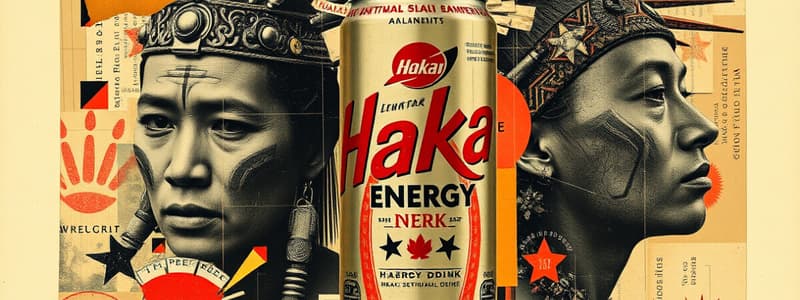Podcast
Questions and Answers
What was the main reason for the backlash against the Haka Energy Drink?
What was the main reason for the backlash against the Haka Energy Drink?
- The ingredients were sourced from unsafe locations.
- The marketing strategy was too aggressive.
- The drink's pricing was considered too high.
- The brand name was seen as culturally inappropriate. (correct)
Which slogan was used in the marketing of Haka Energy Drink?
Which slogan was used in the marketing of Haka Energy Drink?
- Energize Your Life
- Live Boldly
- Fuel Your Day
- Unleash Your Inner Warrior (correct)
What cultural element was used in conjunction with the marketing of the drink?
What cultural element was used in conjunction with the marketing of the drink?
- Dance performances
- Songs by popular New Zealand artists
- A techno version of a haka (correct)
- Traditional Maori music
What action did the drink maker Hakaenergy take in response to the criticism?
What action did the drink maker Hakaenergy take in response to the criticism?
Which demographic expressed outrage at the product's marketing?
Which demographic expressed outrage at the product's marketing?
When was the Haka Energy Drink first made?
When was the Haka Energy Drink first made?
What was Kimoti Ketu's criticism regarding the drink's marketing?
What was Kimoti Ketu's criticism regarding the drink's marketing?
What kind of drink is Haka Energy Drink primarily based on?
What kind of drink is Haka Energy Drink primarily based on?
What is the primary concern regarding the use of Maori culture in marketing?
What is the primary concern regarding the use of Maori culture in marketing?
What did Nanaia Mahuta emphasize regarding the use of Maori cultural elements?
What did Nanaia Mahuta emphasize regarding the use of Maori cultural elements?
What was Te Ururoa Flavell's perspective on the association of haka with energy drinks?
What was Te Ururoa Flavell's perspective on the association of haka with energy drinks?
What action has the New Zealand High Commission in Ottawa taken in response to the concerns raised?
What action has the New Zealand High Commission in Ottawa taken in response to the concerns raised?
What did Awa Associates co-director Papatuanuku Nahi find particularly outrageous?
What did Awa Associates co-director Papatuanuku Nahi find particularly outrageous?
According to Dr. Steve Elers, what challenges would New Zealand face regarding the South American company's use of the word haka?
According to Dr. Steve Elers, what challenges would New Zealand face regarding the South American company's use of the word haka?
What cultural issue does the commodification of haka primarily relate to?
What cultural issue does the commodification of haka primarily relate to?
What underlying sentiment do the concerns about marketing materials convey?
What underlying sentiment do the concerns about marketing materials convey?
Flashcards are hidden until you start studying
Study Notes
Background of Haka Drink Controversy
- Haka Energy Drink launched in Canada, causing outrage among Kiwis over perceived cultural misappropriation of Māori traditions.
- NZ High Commission in Ottawa is investigating complaints from New Zealanders living in Canada.
Marketing and Branding Issues
- Drink marketed under slogans like "Unleash your inner warrior" and features imagery of a warrior with a moko.
- Associated with a techno rendition of a haka, which intensified concerns among Māori and expat communities.
Public Reaction
- Members of Kia Ora Canada Facebook page expressed strong disapproval; calls for government intervention were made.
- Consumers in Toronto reported seeing the drink sold in convenience stores and bars, as well as online.
Company Response
- Hakaenergy apologized for any offense caused and announced a review of their marketing materials.
- Company characterizes itself as a small, family-owned business with no intention to offend.
Statements from Māori Leaders
- Nanaia Mahuta, spokeswoman for Labour Māori Affairs, criticized the corporate exploitation of Māori culture, stressing the need for indigenous consent in such representations.
- Te Ururoa Flavell of the Māori Party expressed dismay over cultural misappropriation for profit, highlighting the need for due diligence in branding.
Academic Perspective
- Dr. Steve Elers from Massey University noted the lack of legal means for New Zealand to prevent a foreign company from using culturally significant terms.
- He commented on a historical pattern of commodification of indigenous cultures, diminishing the cultural integrity of concepts like haka.
Broader Implications
- Concerns raised about the commercialization of indigenous imagery and traditions, particularly in connection with unhealthy products like sugary drinks, reinforcing harmful stereotypes.
- Discussion highlights the necessity for international protocols to engage and respect indigenous cultures in marketing and branding practices.
Studying That Suits You
Use AI to generate personalized quizzes and flashcards to suit your learning preferences.




